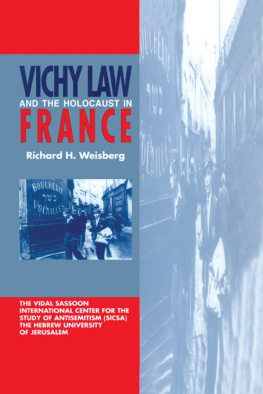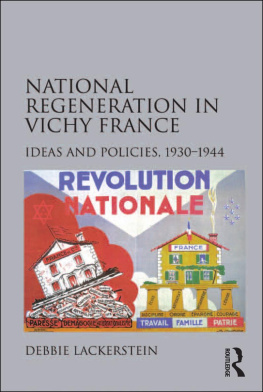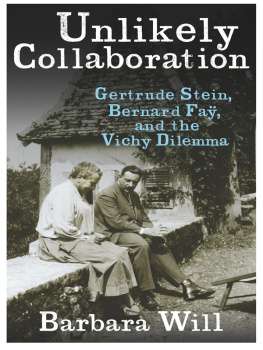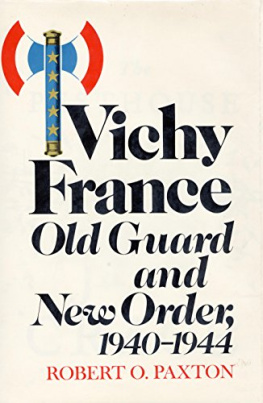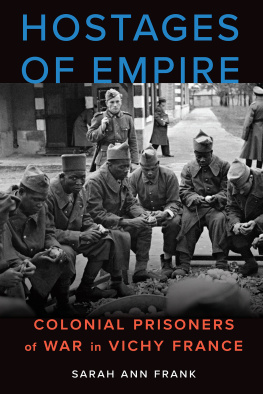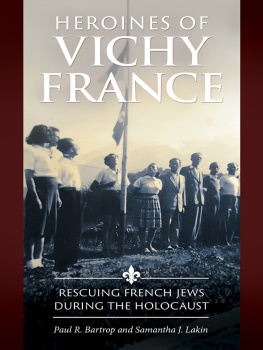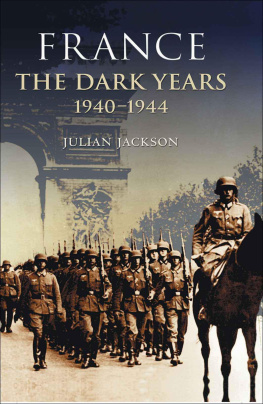Vichy Law and the Holocaust in France
Studies in Antisemitism
Series Editor Yehuda Bauer
Chairman, Vidal Sassoon International Center for the Study of Antisemitism The Hebrew University of Jerusalem
Studies in Antisemitism brings together in one series major worldwide research on this complex phenomenon from which the student and decision-maker as well as the general public may learn. The studies cover antisemitism, ancient and modern, from a broad range of perspectives: historical, religious, political, cultural, social, psychological and economic.
Volume 1
The Catholic Church and Antisemitism
Poland, 1933-1939
Ronald Modras
Volume 2
Russian Antisemitism, Pamyat, and the Demonology of Zionism
William Korey
Volume 3
Vichy Law and the Holocaust in France
Richard H. Weisberg
ISSN 1023 6163
First published by Harwood Academic Publishers
This edition published 2013 by Routledge
Routledge
Taylor & Francis Group
711 Third Avenue
New York, NY 10017
Routledge
Taylor & Francis Group
2 Park Square, Milton Park
Abingdon, Oxon 0X14 4RN
Routledge is an imprint of the Taylor & Francis Group, an informa business
Copyright 1996 by OPA (Overseas Publishers Association) Amsterdam B.V.
Published in The Netherlands by Harwood Academic Publishers GmbH.
All rights reserved.
No part of this book may be reproduced or utilized in any form or by any means, electronic or mechanical, including photocopying and recording, or by any information storage or retrieval system, without permission in writing from the publisher.
British Library Cataloguing in Publication Data
Weisberg, Richard H. 1944-
Vichy Law and the Holocaust in France. - (Studies in Antisemitism; v. 3)
1. Jews - Legal status, law, etc. - France - History - 20th century 2. Holocaust, Jewish (1939-1945) - France 3. France - History - German occupation 1940-1945
I. Title
940.53180944
ISBN 3-7186-5892-5
COVER
Jews BHVP/Keystone/SYGMA
EDITING AND COMPOSITION
Alifa Saadya
A well-researched document of cruel times and insensitive oppressors. The authors words will long reverberate in the readers memory and arouse essential questions about the human condition.
Elie Wiesel
Immensely informativeWeisberg sees the racial laws promulgated by Vichy against the Jews as basically religious laws. His bold thesis, which will no doubt stir controversy, but is argued cogently and with sadness, is that Catholic spirituality, which had stereotyped Jewish faith as legalistic, helped lawyers to tolerate the anti-Jewish legislation, despite the real possibility of challenging it in the name of egalitarian republicanism and guaranties in the French constitution itself.
Geoffrey Hartman
Sterling Professor of Comparative Literature
Yale University
Richard Weisbergs prodigious research and provocative analysis reveals that Vichy laws on the status of Jews outstripped Nazi texts in their legalistic zeal, and that personalities of considerable prestige favored the exclusionary laws, not only marginal bigots brought to power by an aberrational regime. Weisberg reveals the resentment felt by some eminent and even liberal French lawyers about the exaggerated place held by Jews in the Third Republic. This book amply supports the claim that Vichy, seen in this way, is less an aberration than a cyclical French phenomenon.
Jane Ginsburg
Morton L. Janklow Professor of Literary and Artistic Property Law
Columbia University
Vichy Law and the Holocaust in France tells an appalling and still-contemporary story of the xenophobia of lawyers and of genocide and law. Weisberg has labored meticulously through archival and contemporary sources to document the lowest hour of the French legal profession. This is not only a monumental work of record but also an essay in interpretation of the failure of law.
Peter Goodrich
Birkbeck College
University of London
To Monroe Price
whose vision realized this book
To Cheryl Weisberg
whose love inspired its author
Contents
List of Archival Sources
ALL Alliance Israelite universelle, Paris
AN Archives National
Paris:
Commissariat Gnral aux Questions Juives (CGQJ) et Service de Restitution des Biens Spolis, AJ38: Inventaire, and files 7, 14, 58, 61, 67, 69, 70, 80, 99, 100, 106, 115, 116, 118, 120, 127, 148, 331, 592-601, 801, 1020, 1075, 1076-80
Rgime de Vichy (1940-1944), BB30: files 1708-1718
Seconde Guerre Mondiale, Comit dhistoire de la Deuxime Guerre Mondiale (1951-1980), 72 AJ: Joseph Barthlemy, ministre de la Justice, 1940-1943:411,412,413
Fontainebleau:
Archives Personnelles et Familiales, Papiers Maurice Garon, 304 AP
Bar Association of the City of Paris: Memorandum, On the Attitude of Attorneys Inscribed at the Court of Appeals of Paris Concerning the Authorities of the French State from 1940-1944, Bar Association archivist, Palais de Justice
CDJC Centre de Documentation juive contemporaine, Paris
YV Yad Vashem, Jerusalem: file 0/9; IV-VI (Documents of the CDJC); 98-d;
Leo Israelowicz file; Klarsfeld notebook; Kurt Schendel file
Nearly twenty years ago, while researching Vichy France and the Jews, Robert Paxton and I were struck by the degree to which the murders of Jews from France during 1942-44 were facilitated by two years of aggressive persecution of the Jewish minority, initiated and implemented by the collaborationist rgime at Vichy. That persecution stigmatized the Jews in French society, stripped them of their property and livelihood, turned them into fugitives, and, we argued, facilitated the Nazis deportation of some 75,000 of them to death camps in the east. Many factors contributed to the isolation and victimization of the Jews. But among them, we noted, was a veritable cascade of French laws regulating their situation specificallyno fewer than 143 laws and actes rglementaires generated by the Vichy government. Remarkable as these laws were, so also was the rigor with which they were enforced by the French courts. Even when taking account of local variation, their severity in dealing with Jews seemed outstanding. We noted, for example, that over 650 Jews were convicted for having violated anti-Jewish laws between June 1941 and the middle of 1944, with the overwhelming majority of these being in the period extending through the massive deportations of 1942. Taking the lead from the Conseil dtat, at the very pinnacle of the French legal system, lower courts doggedly worked away at enforcing the anti-Jewish lawsalmost until the very endin what may seem to us a stunning habituation to a sordid routine. In addition, an army of legal practitioners looked up the laws, furnished opinion, filled out forms, and otherwise had untroubled recourse to the legal machinery of Vichys antisemitic enterprise.
We also thought it noteworthy that the anti-Jewish laws slipped into the canon of legal disputation. Working energetically within the system, learned jurists published their opinions on technical and interpretive issues concerning the instruments of persecution. Academics did their part, lending the name of distinguished institutions to their writings on anti-Jewish laws. Careers were enhanced by learned publications on these themes. In reading this material, one should not forget that when it was being written and when some of it was read Jews were being cast into destitution, tom loose from their families, thrown into camps and in some cased deported to their deaths. Elle est pourtant la loi. Obissance lui est due (The law is the law. It must be obeyed), one high official recalled having told head of state Philippe Ptain about the Statut des Juifs a claim that may be taken as emblematic of the entire process.

